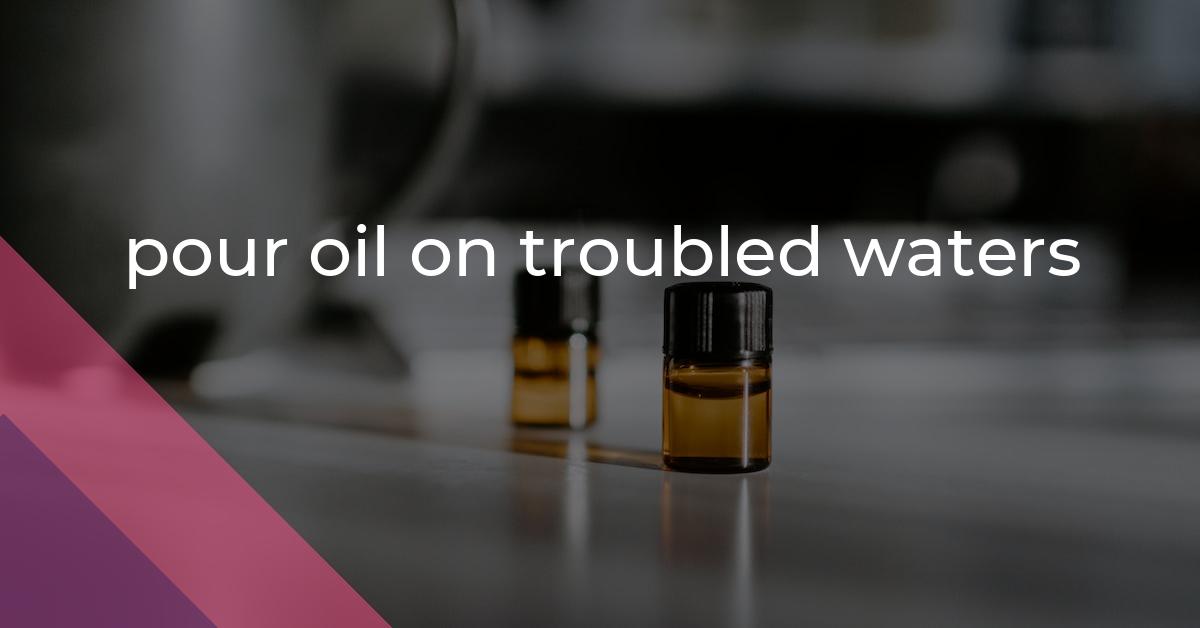pour oil on troubled waters: Idiom Meaning and Origin
What does ‘pour oil on troubled waters’ mean?
The idiom "pour oil on troubled waters" means to do or say something to calm a difficult or tense situation.

Idiom Explorer
The idiom "salt in the wound" means to worsen an already difficult or painful situation, often by adding insult to injury.
The idiom "rub salt in the wound" means to worsen a difficult situation by adding insult or further distress to someone who is already suffering or upset.
The idiom "rub salt in someone's wounds" means to deliberately make someone's pain or sadness worse by reminding them of a painful experience or adding insult to injury.
The idiom "rock the boat" means to cause problems or disruptions by challenging the status quo or traditional way of doing things.
The idiom "rain on one's parade" means to spoil or dampen someone's excitement or joyous occasion by introducing something negative or disappointing.
The idiom "put a damper on" means to spoil or decrease the enthusiasm or excitement of a situation or event.
The idiom "push water uphill" means attempting to do something that is extremely difficult or impossible to achieve. It implies a futile or pointless effort that goes against the natural flow or logic of a situation.
The idiom "prop up" means to support or sustain something or someone that is weak or struggling, often by providing assistance or resources.
The idiom "pour one's heart out" means to confide or express one's deepest and most sincere emotions or thoughts to someone else.
Mystical Troublemaker
'Pour oil on troubled waters' is a popular idiom that means to try to calm down a difficult or tense situation. This phrase has its origins in ancient times, where it was believed that pouring oil onto the sea could calm down large waves or rough waters. The action of pouring oil onto the waters was thought to have a soothing effect, making the waters less turbulent and more manageable.
The idiom 'pour oil on troubled waters' can be traced back to both ancient Greece and Rome. During those times, it was common for ships to carry amphorae filled with oil for various purposes. This oil was used to lubricate machinery and light lamps. However, it was also believed that pouring oil onto the turbulent waters around a ship could calm them down and prevent potential disasters.
One of the earliest recorded uses of this phrase can be found in Pliny the Elder's "Natural History", written in the 1st century AD. In his works, Pliny mentions that mariners would pour oil onto the sea during storms to calm the waves and protect their ships. Other ancient authors like Aelian and Athenaeus also mentioned this practice.
The idiom gained popularity over the centuries and eventually made its way into the English language in the early 17th century. It was used by George Herbert in his poem "The Church-Porch", where he wrote, "He that hath time, and looks for better, Time comes that he shall pour oyle."
Today, the idiom 'pour oil on troubled waters' is commonly used to describe the act of trying to calm down a tense or difficult situation. It implies an attempt to soothe emotions, alleviate conflict, or restore peace and harmony. This idiom is often used in interpersonal relationships, professional settings, and even political contexts.
The figurative meaning of the idiom stems from the belief that just as oil can calm turbulent waters, a calming action or gesture can ease tension and help resolve conflicts. This metaphor suggests that adding a soothing element to a troubling situation may lead to a more favorable outcome.
It's worth noting that there are related idioms that convey similar ideas. One such idiom is 'pour gasoline on the fire', which means to worsen an already tense or difficult situation. It is the opposite of 'pour oil on troubled waters', as it suggests that actions or words can further ignite conflicts and make them more intense.
Another related idiom is 'pour fuel on the fire', which has a similar meaning to 'pour gasoline on the fire'. It conveys the idea of exacerbating a challenging situation by adding more elements that fuel the conflict or tension. Both idioms serve as cautionary expressions, warning against actions that may make a difficult situation even worse.
Lastly, the idiom 'fish in troubled waters' also relates to the concept of tense or difficult situations. This idiom refers to someone who takes advantage of chaotic or troubled circumstances to further their own interests. It suggests that in times of turmoil, some individuals may exploit the situation for personal gain or benefit.
'pour oil on troubled waters' is an idiom that has its origins in ancient seafaring practices and literature. It has evolved to become a metaphorical expression used to describe attempts to calm down difficult or tense situations. The related idioms 'pour gasoline on the fire', 'pour fuel on the fire', and 'fish in troubled waters' serve as contrasting expressions, highlighting the potential consequences of worsening a challenging situation. These idioms collectively remind us of the significance of actions, gestures, and words in navigating and resolving conflicts.
Example usage
Examples:
1. After the argument, John poured oil on troubled waters by apologizing to his friend.
2. The angry customer was calmed down when the manager poured oil on troubled waters and offered a refund.
3. The diplomatic negotiations aimed at pouring oil on troubled waters between the two warring countries.
More "Conflict" idioms



